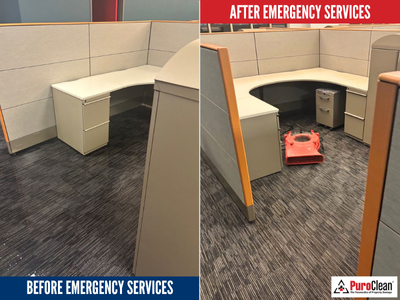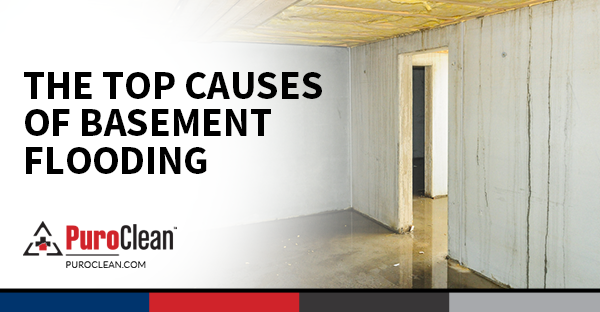Table of Contents
When businesses in Plymouth think about water damage, they often picture ruined flooring, soggy drywall, or damaged equipment. But one of the costliest and overlooked consequences isn’t the visible damage—it’s business interruption.
Business interruption occurs when a company’s operations are temporarily shut down due to water damage, leading to loss of income, productivity, and customer trust. Whether the interruption lasts a few days or stretches into weeks or months, the impact can be devastating—often exceeding the cost of physical repairs.
For restaurants, offices, retail shops, manufacturing facilities, and healthcare providers in Plymouth, the inability to operate normally can lead to cascading financial and operational challenges. Understanding and mitigating these risks is key to protecting both your business and your reputation.
What Causes Business Interruption After Water Damage?
Even a small water intrusion can snowball into major operational setbacks. While some damage is immediately visible, other factors that drive business interruption losses unfold behind the scenes.
Here are the most common causes:
- Extensive Structural Drying
- Multi-story buildings, large warehouses, or properties with basements often require specialized drying. Commercial-grade dehumidifiers and air movers must run continuously to prevent secondary damage, extending downtime.
- Mold Remediation
- If moisture isn’t fully removed within 24–48 hours, mold can begin to grow. Once detected, operations must often stop to ensure proper containment and air quality testing.
- Utility Disruptions
- During restoration, power, water, gas, or HVAC systems may be shut off for safety. Without these utilities, most commercial spaces can’t safely operate.
- Safety and Code Compliance
- Local authorities in Plymouth may require inspections before a business can reopen. Fire safety, electrical, and structural approvals can add time to recovery.
- Permitting and Contractor Scheduling
- In cities with high demand or extreme weather patterns, contractor and permit delays are common. Each additional day adds to business interruption costs.
The Ripple Effect of Business Interruption
The visible cleanup is only part of the recovery process. The financial and operational ripple effects can be even more damaging—especially for small and mid-sized businesses.
1. Lost Revenue and Customer Retention
Every day your business is closed means missed revenue opportunities. Regular customers may turn to competitors and may not return even after you reopen.
2. Employee Displacement
When operations halt, employees may lose hours or temporarily relocate. Keeping staff engaged and informed is vital to maintaining morale and continuity.
3. Supply Chain Disruption
Water damage doesn’t just affect your property—it can disrupt your vendors, logistics partners, and clients. One bottleneck can cascade through the entire production or delivery chain.
4. Insurance and Cash Flow Challenges
Even with business interruption insurance, claims take time to process. In the meantime, rent, payroll, and vendor payments continue—putting strain on cash reserves.
5. Reputational Impact
Extended closures or delays in service can harm your reputation. In today’s digital age, one negative review about slow response or missed deadlines can spread quickly online.
Real-World Scenarios of Business Interruption in Plymouth
Understanding how business interruption unfolds can help you prepare. Here are a few real-world examples we’ve seen in the Plymouth area:
- Restaurant Flooding: A burst pipe during off-hours flooded a kitchen, requiring water extraction, floor replacement, and inspection by the local health department. The restaurant was closed for 10 days—long enough to lose thousands in revenue and food spoilage.
- Office Building Sprinkler Failure: A malfunctioning sprinkler damaged multiple suites in a corporate office park. Even though only one area was affected, the building’s electrical shutdown halted operations for the entire property.
- Retail Store Roof Leak: After a heavy rainstorm, roof leakage damaged lighting and ceiling tiles. The business had to close for safety reasons while electricians completed repairs—just before a key shopping weekend.
In all three situations, rapid response and strategic restoration planning could have significantly reduced downtime.
How PuroClean of Plymouth Minimizes Business Interruption
At PuroClean of Plymouth, our approach to commercial water damage restoration goes far beyond cleanup. We understand that every hour your business is down costs money—and our mission is to get you back up and running safely, efficiently, and with minimal disruption.
Here’s how we do it:
1. 24/7 Rapid Emergency Response
Our technicians are on call around the clock to respond within hours of your emergency. Fast mitigation reduces structural damage, mold risk, and downtime.
2. Advanced Drying and Dehumidification
We use commercial-grade drying systems and moisture monitoring to restore large spaces efficiently. By preventing secondary damage, we shorten the overall restoration timeline.
3. Business Continuity Support
We collaborate with owners, insurers, and property managers to plan restoration around your operations—sometimes allowing partial reopening during repairs.
4. Insurance Coordination
Our team works directly with insurance adjusters to streamline documentation and claims processing, ensuring fewer delays and faster approvals.
5. Transparent Communication
We provide regular updates on progress and projected completion, helping you plan staffing, inventory, and operations with confidence.
6. Reconstruction and Final Restoration
Once mitigation is complete, our certified team handles reconstruction—repairing flooring, drywall, insulation, and other damaged materials so your business can reopen looking better than ever.
The Cost of Delayed Action
The longer water damage goes unaddressed, the more severe the interruption becomes. Here’s what happens over time:
- Within 24 hours: Moisture seeps into walls and flooring, softening drywall and damaging insulation.
- Within 48–72 hours: Mold spores begin to grow, creating air quality concerns and possible shutdowns.
- Within a week: Wood framing, baseboards, and subflooring may need to be replaced. Odors become more pronounced, and restoration becomes more complex.
- After several weeks: Structural components can weaken, and the costs of both restoration and business interruption increase exponentially.
Prompt action is key—not just for cleanup, but for financial protection.
Proactive Steps to Prevent Business Interruption
The best way to reduce business interruption losses is through prevention and preparation. Here’s how your company can get ahead of potential water emergencies:
1. Create an Emergency Response Plan (ERP)
Develop a written plan outlining what to do, who to call, and where to access key shutoffs. Consider partnering with PuroClean of Plymouth to establish a Priority Response Plan (PRP) customized for your property.
2. Conduct Regular Inspections
Have plumbing, roofing, and sprinkler systems inspected at least twice a year. Routine maintenance helps identify leaks or vulnerabilities before they cause damage.
3. Safeguard High-Risk Areas
Move inventory, electrical equipment, and paper records away from basements or areas prone to flooding. Use waterproof containers or offsite storage for critical documents.
4. Review Insurance Policies
Ensure your business interruption insurance and water damage coverage reflect your current operations. Some policies may exclude flood damage or limit compensation for lost income.
5. Educate Your Team
Train employees to recognize early signs of leaks, know how to shut off main water valves, and report potential risks immediately.
Why Business Interruption Planning Matters for Plymouth Businesses
Local businesses in Plymouth face unique challenges depending on geography, weather, and infrastructure. Seasonal storms, rapid freeze-thaw cycles, and aging water systems all contribute to higher water damage risks.
By prioritizing business continuity planning, companies protect their long-term sustainability. Fast recovery not only preserves income—it strengthens relationships with customers, employees, and the community.
Why Choose PuroClean of Plymouth?
At PuroClean of Plymouth, we combine technical expertise with compassionate, local service. Our certified technicians specialize in:
- Commercial water damage restoration
- Fire and smoke damage cleanup
- Mold remediation
- Reconstruction and structural repair
We understand that business downtime affects livelihoods—and our goal is to minimize that impact while restoring your property to pre-loss condition.
See what our local customers are saying on Google and learn more about our services at PuroClean of Plymouth.



